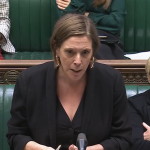yleene Klass has said that if the Government does not implement changes to the way woman are treated following miscarriages then it no longer “deserves power”.
The former Hear’Say singer met with the Minister for Women’s Health, Maria Caulfield, on Monday at the Tommy’s National Centre for Miscarriage Research in Birmingham.
Klass, who had previously been outspoken about her four miscarriages, organised the visit at the pregnancy charity’s centre – located in Birmingham Women’s Hospital which also contains an early pregnancy unit – alongside Labour MP Olivia Blake.
The 45-year-old presenter urged the Government to make sure women receive medical intervention after every miscarriage, not just three, 24 hours specialist care and support for pregnancy and for data to be collected to understand the scale of the issue.
According to the NHS website, if a woman has had three or more miscarriages in a row then further tests will be given to understand the cause.
Klass told the PA news agency that a soon to be published pregnancy loss review, which looks at improving NHS gynaecology and maternity care, could provide a “massive” change if implemented.
She said: “If the policy (does) include these changes, the face of women’s health care is going to change unrecognizably and it will be a wonderful time for our children and our children’s children to know that we made a movement happen that actually protected women’s health.”
When asked how she would feel if there are no changes, Klass said: “A health secretary and a health department and a government that doesn’t look after the people, that is in a position and empowered to do so, doesn’t deserve to hold (onto) that power.”
The mother to daughters Ava and Hero and son Apollo said she has been “very frustrated” after a “real David and Goliath” battle with the Government.
She said: “I do find that women’s health is so far down on the agenda and it’s so misogynistic as to why it really is, from the tablets we are given to take, all the way through to the treatment that we receive, or rather the lack of treatment that we receive.
“I think it’s pretty evident that we were told to just put up and shut up and that is not the world that we live in anymore.”
Klass added that care for women going through miscarriages is not addressed as it is “taboo” and “makes people uncomfortable”.
She said: “It’s so cruel when you have experienced the process of it, I’ve never done so much paperwork.
“A little baby that never existed and yet the paperwork is excessive and you’re asking a woman to sign away… what do they refer to it as? The products of pregnancy, even our paperwork is incorrect.”
Klass also said that the difference between women receiving care in an early pregnancy unit are a “lottery” as in certain parts of the country the centres can be closed during certain hours and at the weekend.
She added: “So this is something that is actually costing the economy more, because people are being sent to the wrong places and really desperately suffering with their PTSD.”
Klass said that one treatment, a steroid hormone called progesterone, should be administered to more women at risk and GPs should receive more training about the drug.
Klass said: “If there is still a heartbeat and you’re bleeding (and) you are given progesterone, you’ve got a chance, I know this better than anybody because that’s how I had my son.
“Can you imagine if you do suffer a miscarriage you sometimes or very often have to wait for your GP to then sign you off to get the secondary scan? That means… you have to wait to have your baby removed.”
Klass said she hopes things have “shifted” after Ms Caulfield’s visit.
In a statement, the minister said the work done by Tommy’s is “so important” as pregnancy loss can be “hugely devastating and traumatic” and thanked those at the centre for sharing their stories.
Ms Caulfield said: “I’ll keep working to ensure women and their families can access the best possible care following complications in pregnancy.
“The independent review into pregnancy loss – the findings of which will be published shortly – will consider how we can improve care so women and families receive the support they need.”











